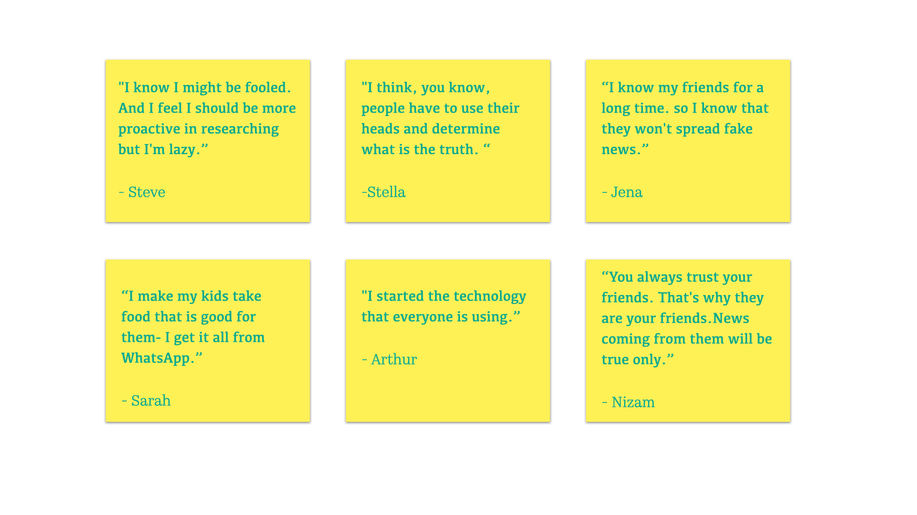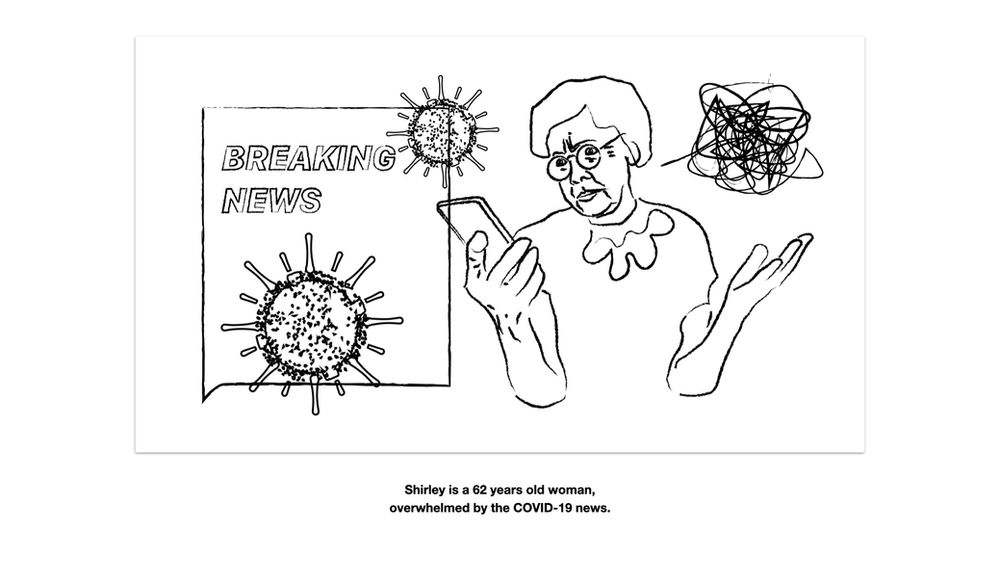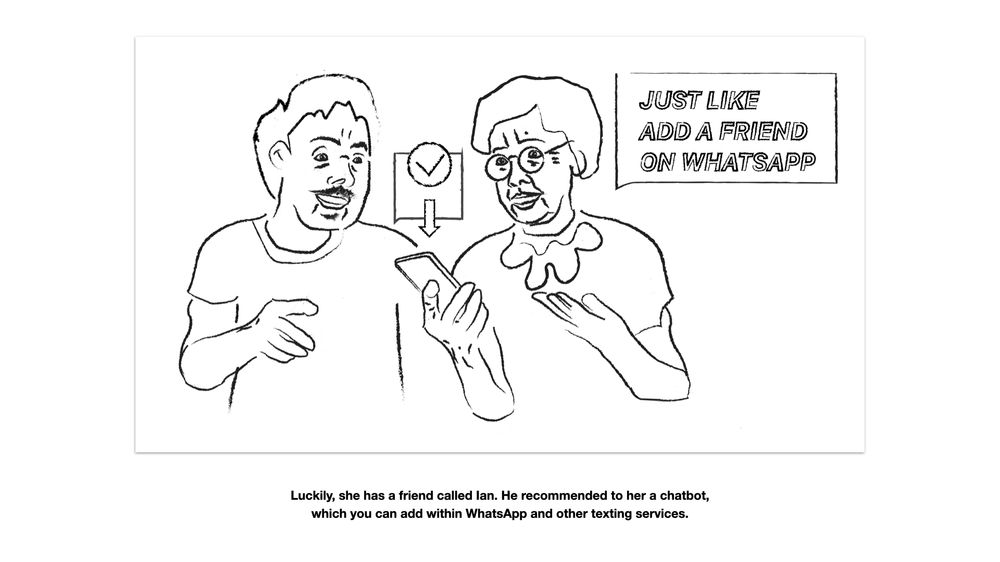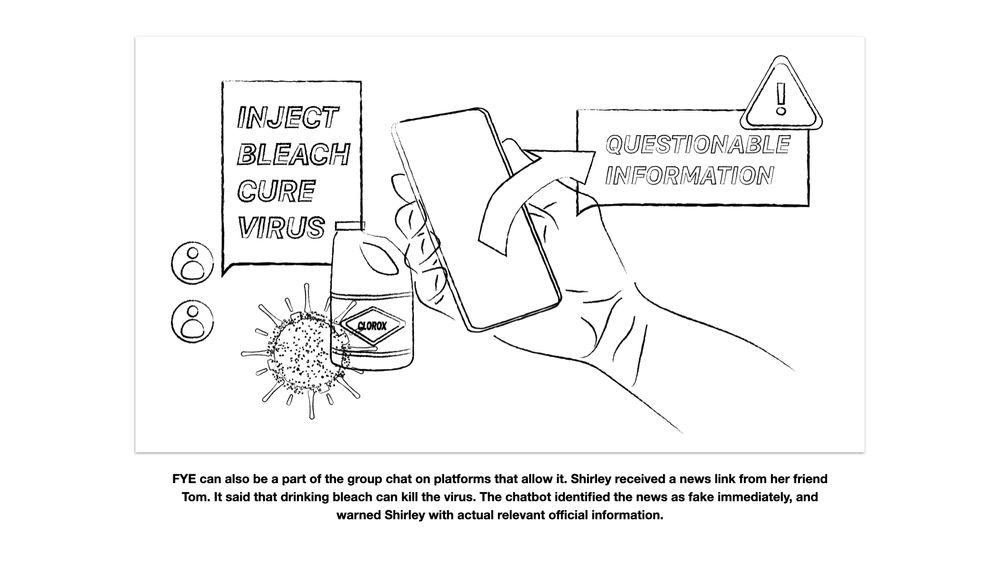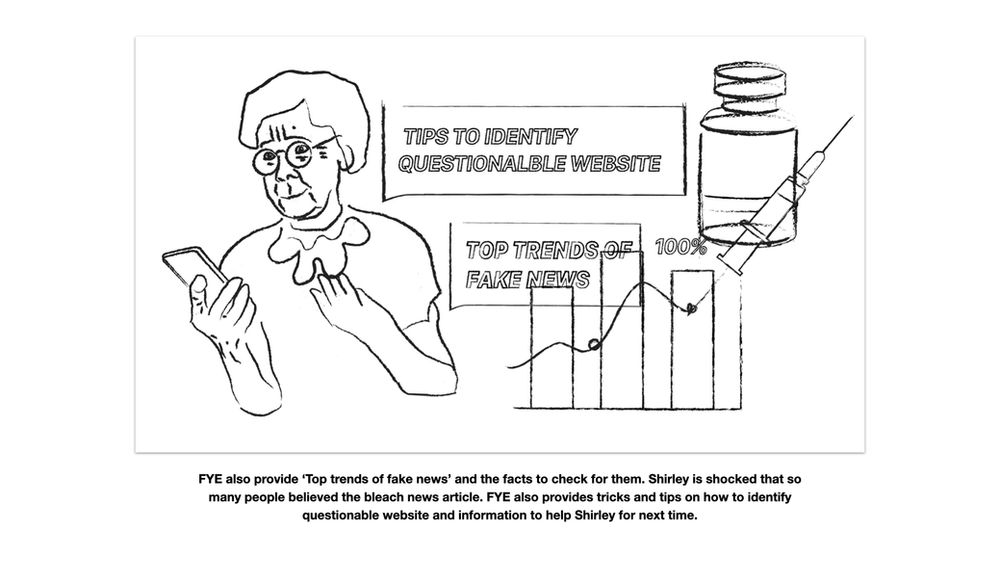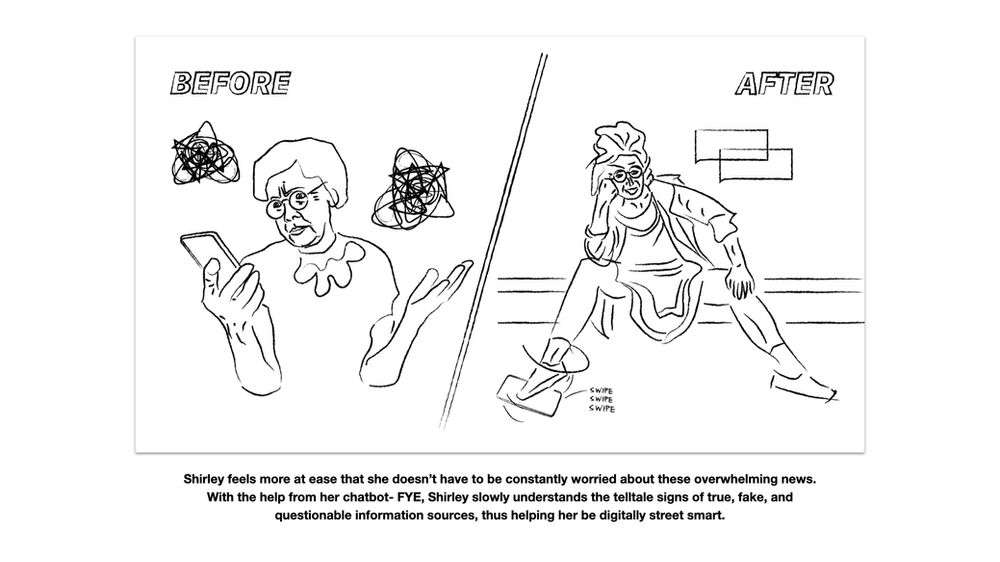Project Fye
Understanding of how senior citizens discern truth and authenticity in news and media.
Fact-check bot for Older Adults countering information bubble

Challenge
Understanding of how senior citizens discern truth and authenticity in news and media.
How might we provide a succinct experience to make Older Adults digitally street smart?
Designer
Wilson Wu
Purva Takkar
Wiryan Tirtarahardja
Jenn Jiang
Time
May.2020
Role / Contribution
Design research
User Experience Design
User Interface Design
Prototyping
System Modeling
Service Blueprint
Brief
We hoped to learn how senior citizens are impacted by the information bubble that they live in online and gain an understanding of how they discern truth and authenticity in news and media.
Senior citizens as defined in the United States are people over the age of 60. We interview 6 seniors and 2 senior experts on this matter. Screening for senior citizens that have online activities such as social networking and social media.
After the interviews and synthesis process. We realized that Older Adults were overwhelmed with the amount of information online and did not know what to believe. While peer pressure from family got them there, they still preferred offline talks. Their opinions also brought about a reluctance of being their true self. We also find out the issue of ageism in media houses and tech service providers sometimes categorized all Older adults over 60 in the same group.
From there we form the HMW question and propose a fact-checker chatbot for all forwards. It helps users to fact check and provides other relevant content and trends. The design can be implemented in the medium that they are already accustomed to.
View Full Project ↓
Background
We hope to learn how senior citizens are impacted by the information bubble that they live in online.
We also hope to gain an understanding of how senior citizens discern truth and authenticity in news and media.
All of us have always had Older adults like our grandparents be a joyous part of our lives. We learn continuously from them and help them learn in these new modern times.
We hope to learn how senior citizens are impacted by the information bubble that they live in online. We also hope to gain an understanding of how senior citizens discern truth and authenticity in news and media.
But what does that even mean?
An information bubble is the bubble that algorithms create for you based on your online activity without you even realizing it.
For our research, we stuck to AARP’s definition that anyone over the age of 60 is a Senior Citizen.
Secondary Research

We initiate secondary research online to know the theme and context regarding the impact of the information bubble on older adults. Using prompts keyword such as "Senior citizens", "Information bubble", "social media", "Older Adults and Technology", "News", "Truth and authenticity".
Elders and Social Media
“The fastest growing social media population is now above 74 years of age.”
11% of Facebook users (14.8 million people) are seniors
- Research by Redhaven Care
Elders and Post Truth / Fake news
“Older People Shared Fake News on Facebook More Than Others in 2016 Race, Study Says.”
Another analysis Shows How Viral Fake Election News Stories Outperformed Real News On Facebook
- NewYorkTime
We used Affinity Diagramming to collaboratively sort clutter findings into themes and spotlight the most important quotation.
Elders are the majority
“America Is A Country Of Old People. And That’s A Huge Problem…”
A large chunk of the population is above 60 years old, however, their views and priorities are often overlooked or neglect from the majority.
- Rantt Media, Greg Fish
Loneliness and isolation issue
“1/3 old people are lonely, which lack of physical contact and do not spend much time socializing”
Loneliness affects old people’s health, on top of the fact that due to their advanced age they most vulnerable to diseases.
- U.S. Department of Health and Human Services
Interview



We interviewed 6 seniors and 2 senior experts. We are looking for senior citizens (above 60s) who use digital communications (social media, instant messaging, etc).
On our journey to find out. We realized that senior citizens took offence to the term and we shifted to “Older Adults”. Also, they were hesitant to be interviewed as they feared judgment. Despite the disruption of COVID-19, we managed to speak to these 6 Older adults.
During the interviews, we also performed some exercises (when possible) where we observed and evaluated their process of discerning true/false information over prepared article clippings and a “Facebook Wall” co-design where they listed content they wanted to see the most on their feed.

Barry Katz
Author, CCA, Stanford Professor, Design Historian
Gretchen Addi
Design Consultant, IDEO
We also reached out to two experts to help us truly understand the nuances. Barry Katz, a design Historian helped us study the history of media and how the older adults have grown with that. Gretchen Addi, a design consultant at Ideo, brought to us the perspective of ageism and how most platforms these days aren’t designed for Older Adults.
Framing
Rich with all the knowledge that we had learned, we started mapping out all these interviews. As we arranged these post-its over and over, an initial very broad framework and themes started to emerge.
We realized that Older Adults were overwhelmed with the amount of information online and did not know what to believe. While peer pressure from family got them there, they still preferred offline talks. Their opinions also brought about a reluctance of being their true self. We also find out the issue of ageism in media houses and tech service providers sometimes categorized all Older adults over 60 in the same group.
There was an online information consumption pattern. From whatever their touchpoints online are, Older Adults encounter information, evaluate it in their own particular ways, act upon it or ignore it which forms a mindset, which in turn reinforces the information they encounter on these touchpoints.
Insight
Older adults don't necessarily go out of their way to find out what is the truth but instead, rely on their own experience to believe whatever seems right.
Older adults have trouble differentiating between true and fake media websites as they didn't develop the digital street smarts with time.
Older adults are overwhelmed by the numerous new platforms and sources, therefore they tend to choose legacy media houses as credible sources.
Older adults love for friends and family gets them on different platforms helping them to stay connected with the world.
Opportunities
How might we provide a succinct experience to make Older Adults digitally street smart?
Why succinct?
Succinct because older adults already have enough platforms and touchpoints to maintain. We want to meet them where they are, right when they encounter information, as that is the greatest impact we can make.




Why digitally street smart?
Older adults have a lifetime of real-world experience. This may or may not have converted digitally, but they do want to learn. We want to do this so that they could continually grow digitally too.
Journey mapping to possibile entry point

We synthesized a journey map of what an older adult could experience with conflicting information they encounter throughout their daily life.
When they first encountered a piece of information their opinion could be affected by the first person they talk and share with. Their thought levels may depend on if they encounter another person who might reinforce or counter their stance on said information, and even if they are presented with arguments and information from more “credible” news sources they might not change their mind.
Design Principle
Build trust through facts
Aim to build trust by using validated information only
Acknowledge the whole picture
We know that seeing the bigger picture takes time, and we want enable our audience by showcasing all sides so they can break out of their bubble
Meet them where they are
We reach our audience where they already are, by leveraging the platform or tool that they are already comfortable and familiar with
Begin with quick and sharp content
For ease of consumption, our content should be quick and be in everyday easy language
De-clutter, not overwhelm
With an information overload already happening, we are designing to push across important curated content based on selected choices
Explore Concept
Keeping the design principles in mind during our brainstorming, we have three big ideas. Identification, Curator, Chatbot. We developed our direction into concrete concepts, we proposed three solutions. Interestingly, we see the opportunities for combining each strength. Here, we proposed our idea...
Introducing: Fye
A Simple fact-check friend on your IM platform

For Older Adults who want a quick professional fact-checker and educator. We will offer a texting bot for any texting platform that helps you discern true and false news and uniquely provides you with different perspectives from across the globe.
The need: Fact checker on the platform most used
The who: For Older Adults
The Value: Get a new perspective on things
The Impact: Help Older Adults learn the true and false websites out there while expanding their bubble
Storyboard / Usage Scenario
Overview Service Blueprint
↑
Click for full screen
User Flow / onboarding
Step1: Introduction and Perferble Platform
Our audiences find our website. We offer different guidance and steps to introduce ourselves to their phone IM services, depends on their preferable platform.


Audiences add us as a contact in their own active using IM platform. FYE will give brief service instruction. Audiences can now directly talk to FYE as a real person for the latest news trends and fact-checking services. Users can also share FYE as human contact with other people, adding them to the group chat.
Step2: Meet on the platform, Like friend.
User Flow / fact-checking

Step3: Examine
Step1: Encounter
Step2:
Forward
In any chatroom, a contact forwarded a news link to the user, which may be questionable.
With suspicion, user can directly forwards it to our chatbot FYE for fact check.
As FYE dectects a news links being forward to it, he will initiate algorithm in the backstage to reviewe news articles/ information.

Step4:
Report
Step5:
Evidence and more
After cross reference at the backstage, FYE shows the result and provides related news and articles to support the result. In addition, intuitively gather different perspectives and sources on the same topic.




